“I am but mad north-north-west: when the wind is southerly, I know a hawk from a handsaw”, says Hamlet in Shakespeare’s eponymous play. He says it to his newly-arrived school friends, Rosencrantz and Guildenstern, to explain his supposed madness. The two have been summoned by his mother and his uncle, the king, in an attempt to ‘cure him’, but he knows they’re only doing it for the money. He is really hinting that he sees the king as a hawk and his two deceitful friends as mere ‘handsaws’. The word ‘handsaw’ is supposedly an English dialect corruption of ‘heronshaw’ or ‘hernshaw’, derived from the Old French ‘heronçeau’. It means heron, an aquatic bird of the family ardeidae, and, although carnivorous, it restricts itself to fish, small reptiles, amphibians, insects and shellfish. It is nothing like a hawk, while Mike Pompeo, the US Secretary of State, is clearly a hawk through and through, predatory and red in tooth and claw. No-one could mistake him for a heron. Now he’s got his talons out for European leaders, to rend them with his sharp beak, figuratively speaking. So far, no-one is really listening.
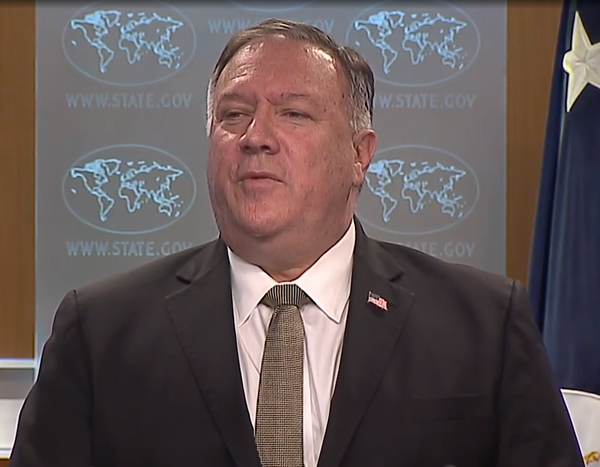
Mike Pompeo, United States Secretary of State © state.gov
Pompeo has accused Europe’s leaders of “siding with the ayatollahs” because they have refused to back attempts by the United States to reimpose sanctions on Iran over its supposed nuclear ambitions. But the Europeans, together with Russia, China and a number of other countries have pointed out that Washington is no longer a party to the so-called Joint Comprehensive Plan of Action (JCPoA), set up under UN Security Council Resolution 2231, which they are keen to preserve. President Donald Trump pulled the US out of the JCPoA in 2018 but claims that as one of the parties to the original agreement, he still has the right to invoke the clause that allows for sanctions to be reinstated (the term is ‘snapback’, since they would simply reimpose what was previously there). The other parties disagree, and they’re not impressed by the letter Pompeo sent to Indonesia’s UN ambassador, whose country currently holds the rotating presidency of the Security Council, accusing Iran of, as Pompeo put it, “significant non-compliance with the terms set out in the 2015 agreement”. But France, Germany and the United Kingdom issued a joint statement in response to the letter, saying it was incompatible with their attempts to preserve the agreement. That hasn’t pleased Pompeo, who suggested that they privately agree with the US but lack the courage to follow through. He said their weakness is endangering the lives of people in Iraq, Yemen, Lebanon and Syria, as well as their own citizens, and those of the United States, of course.
The issue prompted an angry response from Russia after the US vetoed a proposed meeting proposed by Russia to discuss the issue. “Looks like there are two planets,” wrote Russia’s Deputy Ambassador to the UN, Dmitry Polyansky, in a Tweet. “A fictional dog-eats-dog one where the US pretends it can do whatever it wants without ‘cajoling’ anyone, breach and leave deals but still benefit from them, and another one where the rest of the world lives and where intl (international) law and diplomacy reign.”

Dmitry Polyanskiy, Deputy Permanent Representative of the Russian Federation to the United Nations © UN Photo/Loey Felipe
The Chinese also objected, calling into question the legal grounds for acting on Pompeo’s letter. A spokesperson said that “it is nothing but a political show staged by the United States”. Now it all comes down to timing, with the Europeans hoping to keep the JCPoA in play in the hopes that it will be extended if Trump loses the presidential election to Joe Biden, who is more likely to retain it. The fear in Europe is that the reimposition of sanctions would cause Iran to repudiate the deal and withdraw completely, allowing Iranian scientists to go ahead with building nuclear weapons. In point of fact, though, time may not be on the Europeans’ side. Under the terms of the JCPoA resolution and in accordance with the rules of the Security Council, the sanctions that existed before 2015 will be reimposed unless a motion is passed extending the sanctions relief. Any such move would undoubtedly be vetoed by the Americans, just as they did with Russia’s proposal.
RULES? WHAT RULES?
What of Mike Pompeo, then? A hawk, yes, but also one who flouts the accepted rules and conventions for a Secretary of State. Normally, someone in that position is not supposed to speak at a party political event, such as the Republican National Convention (RNC). Colin Powell, Secretary of State under George W. Bush, said he was not allowed to take part in political debates. “I am obliged not to participate in any way, shape, fashion, or form in parochial, political debates,” he is reported by CNN as having said. The same report also quoted The Washington Post’s long-term State Department reporter, Glen Kessler, as saying of Condoleeza Rice, Powell’s successor, “Off the record, she was keenly interested in the race, constantly checking the Real Clear Politics website. But she made sure she was far away from public partisanship.” Pompeo, after all, is America’s most senior diplomat, even if he seldom seems very diplomatic. As CNN notes, under the Hatch Act, “no federal employee is allowed to engage in overtly political activity”. Passed in 1939, the Hatch Act is designed to “Prevent Pernicious Political Activities” and is a US federal law. Its main provision prohibits civil service employees in the executive branch of the federal government, with the exception of the president and vice president, from engaging in any forms of political activity.

Members of the Security Council unanimously adopt a resolution imposing sanction on the Islamic Republic of Iran, at UN Headquarters in New York on March 24 2007 © UN Photo/Devra Berkowitz
That would most certainly exclude speaking at a party’s national convention. Pompeo would have had an excellent excuse to miss the event (quite apart from the legal restrictions) as he was in Jerusalem on official business at the time. His excuse was that he appeared at the RNC as a ‘private citizen’, despite being absent on State Department business. Private or not, it would appear to have been in breach of the Hatch Act. Obviously, Pompeo wants to see Trump re-elected, but he’s not supposed to go canvassing for him. If he’s prepared to break the rules so blatantly, the chances of him abiding by the normal conventions in his dealings with Tehran are slim. He accuses Tehran of breaking the law but blatantly does so himself.
It’s worth remembering, too, that Pompeo is partly motivated by his evangelical Christian beliefs. He has said he believes in ‘the rapture’ – the ascent into heaven of ‘true believers’ like himself, while the rest of us get to stoke Old Nick’s furnaces. In view of this, he believes that God gave the land of Israel to the Jews and is not opposed to Israel’s takeover of Palestinian lands. He is also opposed to any groups, American or otherwise, that permit or facilitate abortions. So he’s not very likely to favour Iran and it’s Shiite version of Islam. He’s certainly not in favour of allowing a regime such as Tehran’s to get its hands on nuclear weapons. But if he is hardly a believer in agnosticism and freedom not to have a religion, he’s not alone: neither is Iran. USA Today reports that: last month, Mohammad Salas, a member of the Iranian Gonabadi Sufi dervish community, which has been persecuted by the Iranian regime for its beliefs, “was convicted and sentenced to death on questionable grounds following violent clashes between security forces and Gonabadi dervishes. Mr. Salas and his supporters maintained his innocence, reportedly stating he had been tortured into a forced confession. Sadly, on June 18 the regime hanged Mr. Salas in the notorious Rajai Shahr Prison.” I once watched (but was not allowed to film) a performance by whirling dervishes in Cappadocia. The whirling is seen as a religious act, an act of worship, and seemed to me totally unthreatening. Iran, however, has been cracking down on Gonabadi Sufi Muslims, hundreds of whom remain in Iranian prisons because of their beliefs. It’s been reported that some have died at the hands of the security forces, while Iran’s religious intolerance has also seen Sunni Muslims, Christians, Jews, Zoroastrians and other religious minorities imprisoned for practising their faiths. None of them posed much of a threat to Iran’s nuclear programme.
Unfortunately for Iran, it lacks a brilliant physicist like Werner Heisenberg, the head of Germany’s research into nuclear physics, who some scientists believe deliberately delayed work by the Nazis to achieve a nuclear bomb. Within the Nazi party he was known as a “white Jew” – a gentile who acted like a Jew. We will never know for sure if he helped delay the work (he never admitted doing so), which is perhaps appropriate for the man who is famed for the Uncertainty Principle that bears his name, under which the momentum and position of a particle cannot be simultaneously known. However, he did work on nuclear research during the war which now, in retrospect, shows a number of errors which seem unlikely to have emanated from the man who was one of the first to realise that the mathematics of matrices could be used to solve problems in quantum mechanics. In conversations with fellow German scientists secretly recorded during their incarceration in England, he said he was glad Germany had lost the war and that his atomic research had been aimed not at a bomb but at building a source of energy. The main reason Germany failed to develop a nuclear weapon was that its leaders refused to believe that Einstein, being Jewish, could possibly have been right. Nonsensical dogma seems to have saved the world!
But today’s Iran lacks a Heisenberg and its scientists are still working on acquiring heavy water: (deuterium oxide, 2H2O or D2O). Deuterium is an isotope of hydrogen with a nucleus containing a neutron and a proton, while a normal (light) hydrogen atom consists of just a single proton. The presence of a neutron gives an atom of deuterium roughly twice the wait of a hydrogen atom. Physicists use centrifuges to create heavy water, which is not radioactive and is only about 10.6% heavier than ordinary water, rather than twice as heavy, because most of the weight of the molecule is in the oxygen atom. Even so, your body contains deuterium, equivalent to about 5 grams of heavy water.
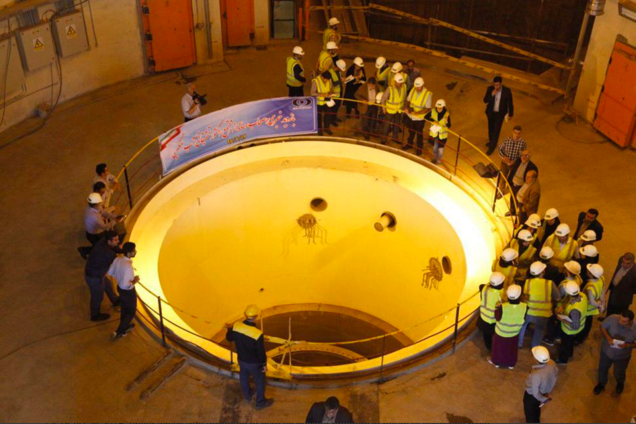
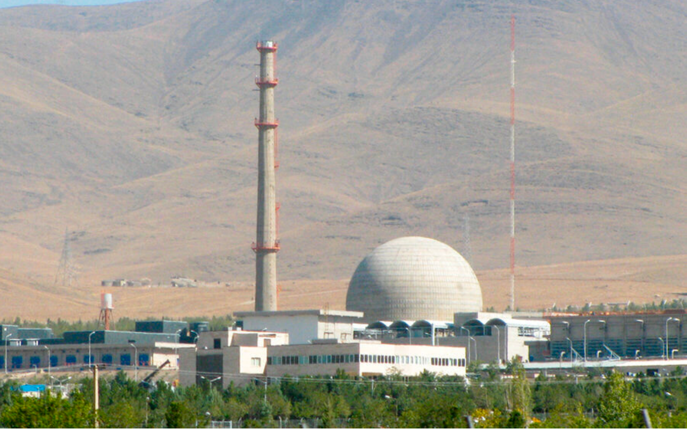
The Ahmadi-Roshan uranium enrichment complex and Heavy Water and research reactors of Khondab and Arak in Iran© Irna
Arak’s Khondab nuclear research site
It is harmless. By November 2019, Iran had already breached the limits set down in the JCPoA for the accumulation of heavy water, which it needs for the reactor it is building, theoretically for energy. Experts believe (and the deal lays down) that 130 metric tonnes of heavy water are needed; it now has rather more than that. The International Atomic Energy Authority was informed that it had (at that time) 131.5 metric tonnes, hardly an excess to frighten the horses but enough to represent a snubbing of its nose at the United States. It had exceeded the limit before, in 2016.
WHO’S BREAKING THE RULES?
That is mainly what prompted Pompeo to lodge his complaint at the Security Council. “No country but the United States,” he said, “has had the courage and conviction to put forward a resolution.” Nor the inclination, he might have added but didn’t. He continued: “Instead, they chose to side with the Ayatollahs.” His action gave the so-called P5+1 group of countries – the US, Russia, China, France, the UK plus Germany – a limited time frame in which to reaffirm sanctions relief for Iran, but as a member of the Security Council, the US will be able to veto it if they do. The other countries of the group are concerned that scrapping the JCPoA altogether would give Tehran carte blanche to develop and sell other armaments to some rather dangerous regimes that are on Europe’s doorstep. However, they’re a long way from the United States, of course.
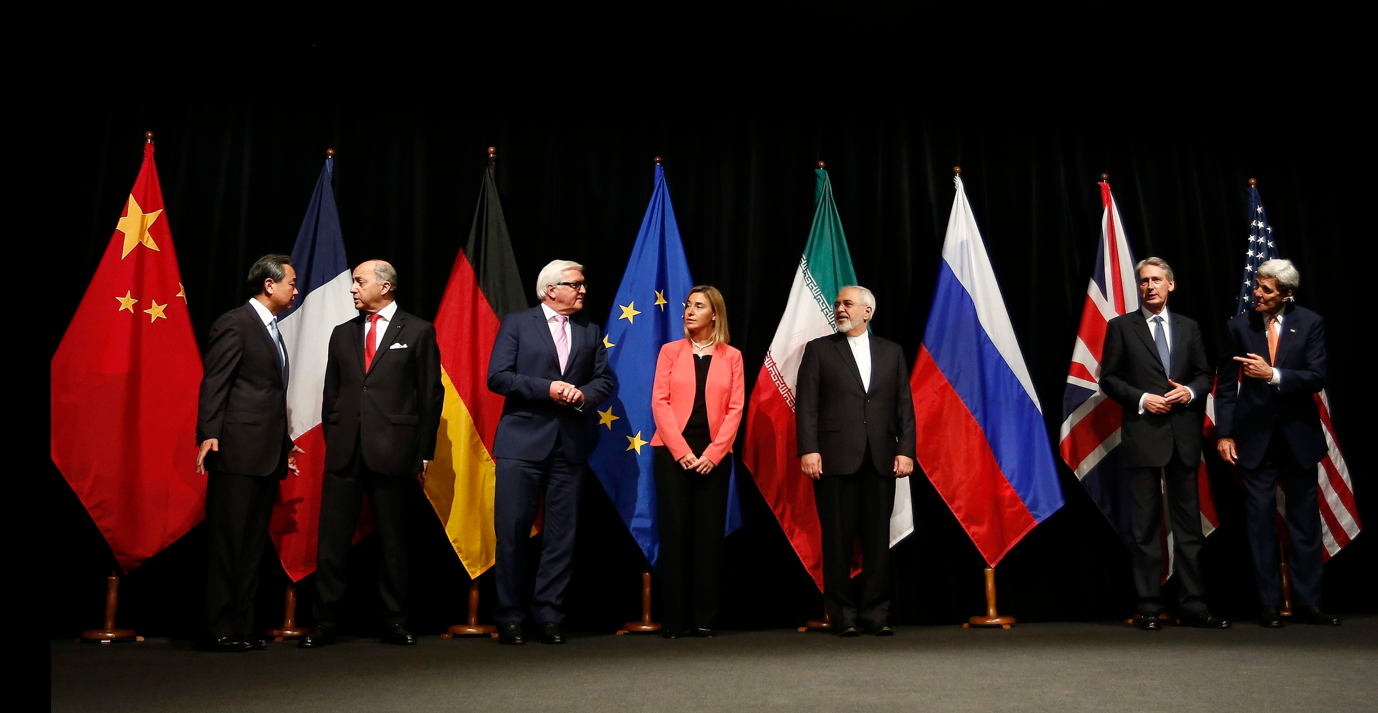
Iran nuclear agreement in Vienna in 2015© Dragan Tatic
The actual accord has been looking distinctly wobbly ever since the US withdrew in 2018 and reinstated economic sanctions in an attempt to force Iran to agree to negotiate a rather different version, curbing its nuclear programme and preventing the development of ballistic missiles. Even so, the five-plus one (apart from the US, of course) have endeavoured to keep the deal in play, despite Germany, France and the UK launching the dispute mechanism in January because of alleged breaches by Iran. That could, of course, have led to a return of the sanctions the US is demanding, although Iran had also expressed dissatisfaction that the deal had not led to the economic benefits and trade deals promised for agreeing to it. “The JCPoA was a negotiated diplomatic solution to the peaceful settlement of an artificial crisis over the Islamic Republic of Iran’s peaceful nuclear program,” the Iranian government said in a statement, “which is comprehensive and final in nature. Iran entered the negotiations seriously, with a forward looking approach, and implemented the outcome of the negotiations in good faith. Transparency and voluntary confidence-building measures, beyond the obligations under the Safeguards Agreement, was part of the Islamic Republic of Iran’s efforts to reassure the international community of the exclusively peaceful nature of its nuclear program, in return it was supposed inhuman sanctions imposed under the pretext of the nuclear program be lifted. Unfortunately, not only the Islamic Republic of Iran did not enjoy the economic benefits of the JCPoA sanction lifting, but once again the opponents of the JCPoA actively based on unsubstantiated allegations on past safeguard issues that was supposed under the JCPoA once for all be closed, trying to fully destroy the achievements of the JCPoA.” Clearly, Tehran is rather annoyed. Of course, when the US withdrew in 2018 it reimposed its own sanctions straight away, which has made things tougher for Iran.
Since July, the IAEA has confirmed that Iran has surpassed its permitted stock of heavy water, enriched uranium and also of the purity to which it enriches uranium. It has also breached its ban on enriching at sites other than its main plant at Natanz and of using types of centrifuges for enrichment that are not approved in the agreement.

U.S. President Donald Trump signs orders, imposing sanctions on Iran’s supreme leader in Washington, DC, June 24, 2019 / VCG Photo
Pompeo has said that the Trump administration would “stop at nothing” to reimpose the embargo. Trump agrees, of course. “My administration will not allow this Iran nuclear situation to go on,” he told journalists in Washington. “They will never have a nuclear weapon.” Germany, France and the UK are determined to try and prevent the US from succeeding in getting a “snapback” of sanctions, arguing that by quitting the deal, Washington lost its right to browbeat the others. The EU’s Foreign Policy chief, Josep Borrell, agrees. He pointed out in a statement that the US had chosen to quit the agreement and he said that the US “cannot, therefore, be considered a participant state for the purposes of possible sanctions snapback foreseen by the resolution. As coordinator of the JCPOA Joint Commission, I will continue to do everything possible to ensure the preservation and full implementation of the JCPoA by all. The JCPoA remains a key pillar of global non-proliferation architecture, contributing to regional security.” One gets the feeling that Borrell and Pompeo, despite both being diplomats (in theory) would not get on very well. Only the US seems to believe that, despite pulling out of the agreement, it still has the right to instigate actions under it. Borrell is unequivocal in his opposition to the move. “As we approach the fifth anniversary of the JCPoA,” he said in early July, “I should like to take this opportunity to recall the importance of the agreement. The JCPoA is an historic achievement for global nuclear non-proliferation contributing to regional and global security. I remain determined to continue working with the participants of the JCPoA and the international community to preserve it.”
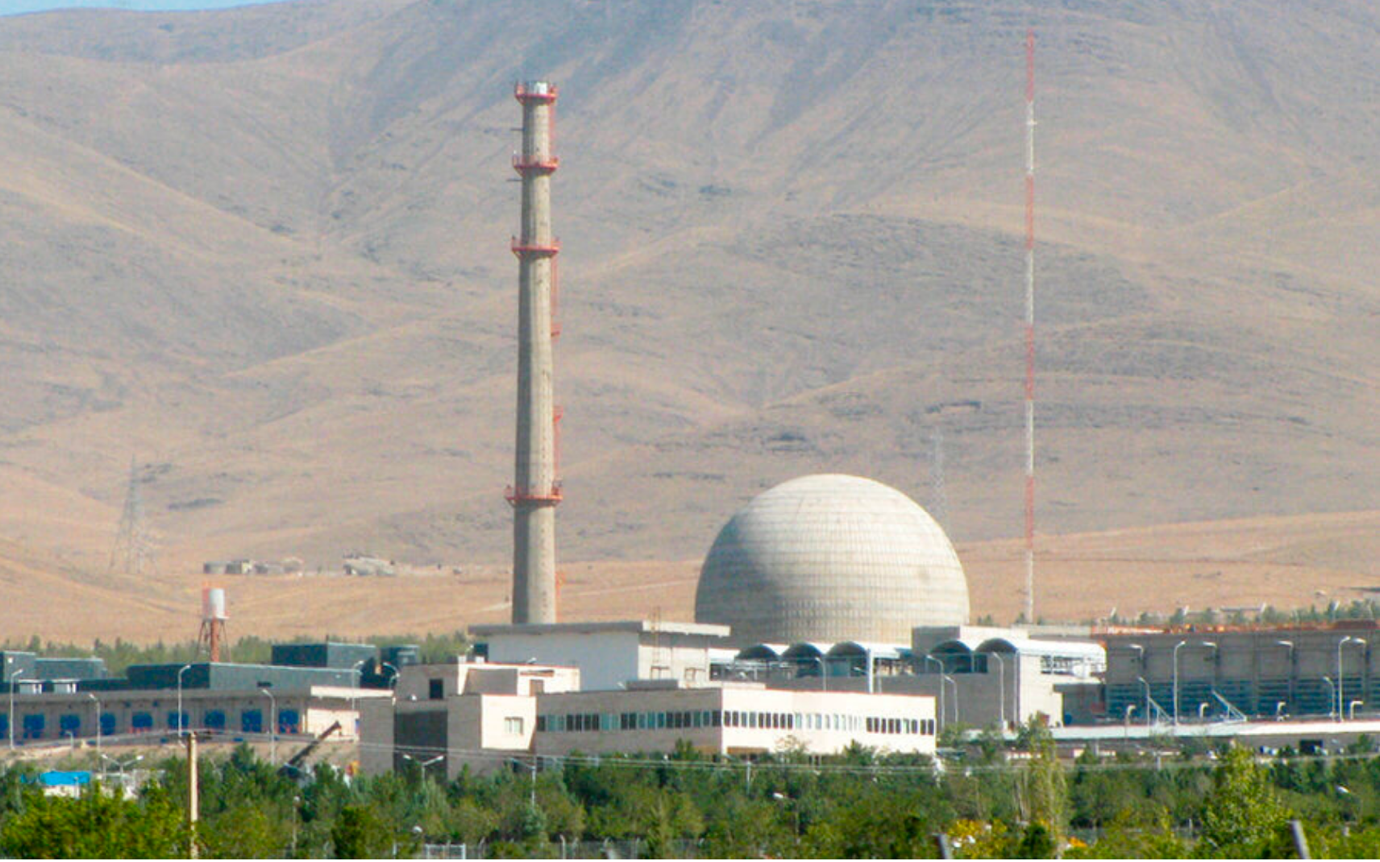
Arak’s Khondab nuclear research site
SPLITTING ATOMS AND ALLIES
Borrell has also repeated the widely-held view that having quit the agreement, the US should not have the right to use it for its own purposes. “As I have repeatedly recalled,” he pointed out, “the US unilaterally ceased participation in the JCPoA by presidential Memorandum on 8 May 2018 and has subsequently not participated in any JCPoA-related activities. It cannot, therefore, be considered to be a JCPoA participant State.” He reiterated the remarks in a telephone conversation with Russian Foreign Minister Sergey Lavrov, according to the EU’s external action service (EEAS). Talking to Lavrov, Borrell reaffirmed his determination to continue to work with Russia, the other remaining participants of the Joint Comprehensive Plan of Action (JCPoA) and the international community, to preserve the agreement, which was concluded on 15 July 2015. Quoted on the German website Qantara.de, Borrell has reminded readers that “It is important to remember that the Iranian nuclear programme remains under tight scrutiny, with its peaceful nature being constantly verified. Thanks to the IAEA inspections regime, we continue to know a great deal about the Iranian nuclear programme, even under the current circumstances. If the agreement were to be lost, however, we would lose these insights and be set back by two decades”. It was an IAEA inspection that revealed that surplus of enriched uranium and heavy water. On Pompeo’s stated intention of restoring UN sanctions, the United States is completely on its own. All the other members of the Security Council are opposed. The Iranian government issued its own statement to mark the JCPoA’s anniversary, quoted on the website of the United States Institute of Peace. “The international, legal, technical, strategic and political capital of this agreement has been deeply eroded on its fifth anniversary,” it said, “due to the destructive and illegal actions of the United States. The remaining Participants of the JCPoA are aware of this and by consensus are of the view that the root cause for the current situation is the continuous violations of UNSCR 2231 and the JCPoA, and ultimately the unilateral withdrawal of the United States from an agreement reached after years of hard multilateral negotiations.”
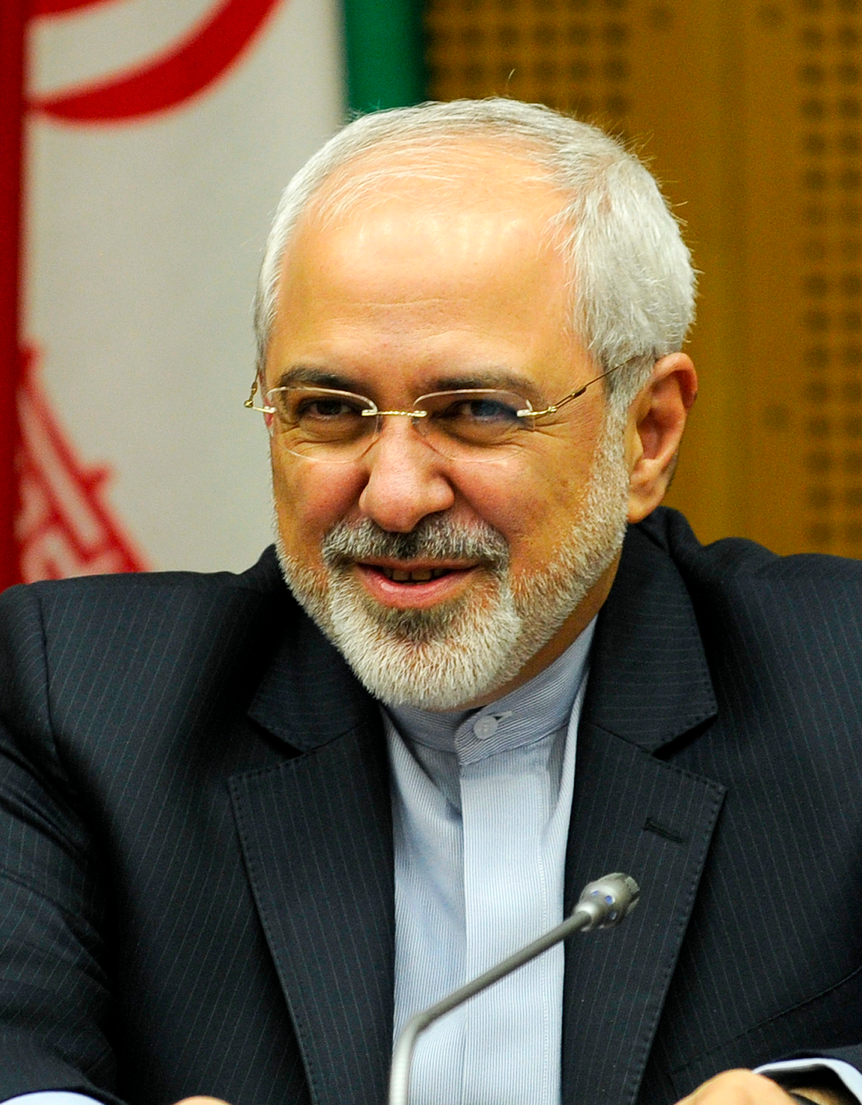
Iran’s Foreign Minister Mohammad Javad Zarif © Wikipedia
Iran’s Foreign Minister, Jarad Zarif, summed it up in a Tweet: “Today is 5th anniv. of the JCPoA—last decade’s greatest diplomatic achievement—and reminder that US lawless behavior should not be the yardstick by which int’l norms are measured. US contempt for law & diplomacy places it in global disrepute & threatens global—and US—security.”
If the US were to succeed in reimposing sanctions, it would force Iran to suspend all its activities related to nuclear enrichment and reprocessing, as well as banning imports of any materials that could conceivably be used in developing nuclear weapons or the required delivery systems. Tehran would almost certainly choose to ignore that and also to promptly forget the restrictions on further nuclear work that are also part of the deal. Sanctions would also be imposed on a number of individuals and entities. According to Mohammad Javad Zarif, Iran’s Foreign Minister, in trying to get a snapback of sanctions after leaving the JCPoA, the US “has no leg to stand on”, while Russia’s Deputy Foreign Minister described the move as “absurd”. The EU’s external action service has said that a meeting of the Joint Commission of the JCPoA was due to take place in Vienna, Austria, on Sept. 1, attended by delegates from China, France, Germany, Russia, the United Kingdom and Iran. Not, you will note, the United States.
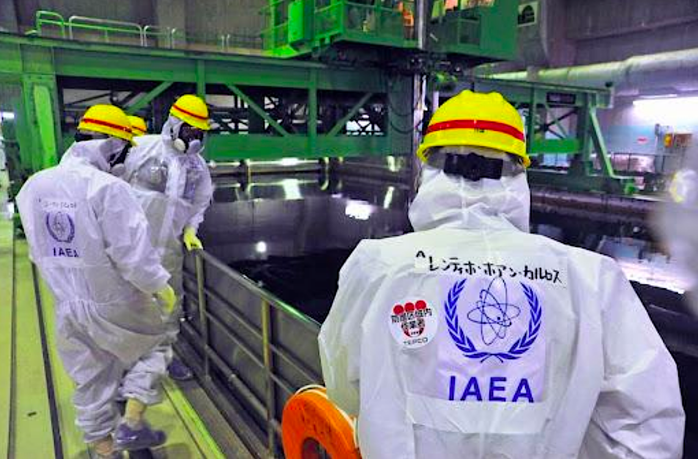
IAEA inspection team © Asia News
But the IAEA received a blunt refusal from Iran for its demand to inspect sites where it’s thought that ‘undeclared’ nuclear materials may be being stored. That sort of thing certainly doesn’t help the UN’s doves (or herons?) but plays into the hands of its hawks. On the fifth anniversary of the JCPoA, Iranian President Hassan Rouhani vowed that the Islamic Republic “will never surrender to the pressure of major world powers, especially the United States.” Not much ambivalence there. However, surrender they did: Iran has now agreed to let the IAEA inspectors into the sites at Karaj and Isfahan, following a personal visit to Tehran by the IAES’s Director General, Rafael Grossi. It’s likely to make the other members of the UN Security Council (not the US, of course) more determined than ever to preserve the JCPoA. Iran and the IAEA issued a joint statement afterwards that Iran was “voluntarily” providing access to the two sites specified and that they had agreed a timetable for the inspection.
HEAVY WATER, STORMY WATERS
Why does heavy water matter? Discovered in 1931 after the isolation of deuterium, it was later found to be useful in moderating neutrons in certain types of nuclear reactors. It’s used to slow down neutrons to encourage them to react with uranium-235, which is fissile (capable of nuclear fission), rather than with uranium-238, which is far less so. Heavy water reactors do not require enriched uranium, but they do provide an easily-obtained source of weapons-grade plutonium. Heavy water reactors are more cost efficient than those using ordinary water because they don’t need the uranium to be enriched – heavy water is cheaper to obtain than enriched uranium – but they do need to have their fuel changed frequently, at which point nuclear reprocessing can produce the weapons-grade plutonium by extracting it from the natural uranium that has been irradiated in the reactor. Since Iran had been refusing to permit inspections of its alleged storage facilities, there was some concern as to whether or not Tehran is collecting and stockpiling plutonium for possible future weapons. That’s why over-producing heavy water is causing Washington more concern that Iran’s uranium enrichment activities or its dodgy centrifuges. Nuclear power plants using ordinary water together with enriched uranium are not a good source of the ingredients needed for nuclear weapons.
So, is Iran secretly building nuclear weapons and the means of delivery? That’s what everyone would like to know, and Tehran won’t tell us. In April 2018, Israeli Prime Minister Benjamin Netanyahu claimed that the seizure of more than 100,000 documents from what he called “Iran’s secret atomic archives” by Israeli intelligence proved that Iran had been seeking to build five 10-kiloton nuclear warheads under a programme that ended in 2003. It sounds as if the Iranian research is at a relatively early stage, even now, although Netanyahu argued that Iran’s secrecy about the programme proved that it had engaged in negotiating the JCPoA “under false pretences”, while others said it proved the importance of the deal in keeping a lid on further advances through the IAEA inspections.
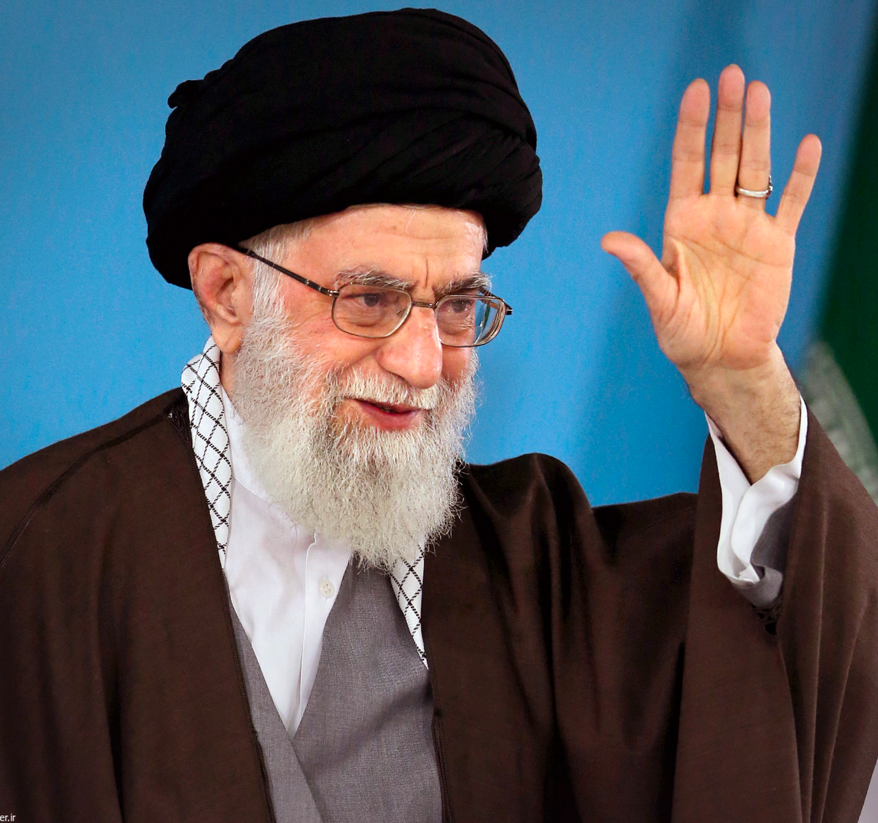
Sayyid Ali Hosseini Khamenei, Supreme Leader of Iran © Leader.ir
In fact, Ayatollah Seyyed Ali Khamenei, Iran’s Supreme Leader, issued a fatwa against the acquisition, development or use of nuclear weapons, which he said were “anti-Islamic”. He is supposed to have declared the fatwa in the 1990s, although it was only made public in October 2003. Many experts doubt if he ever said it, although the Ayatollah’s own website spells it out in Farsi (with translations): “We believe that besides nuclear weapons, other types of weapons of mass destruction, such as chemical and biological weapons also pose a serious threat to humanity. The Iranian nation, which is itself a victim of chemical weapons, feels more than any other nation the danger that is caused by the production and stockpiling of such weapons and is prepared to make use of all of its facilities to counter such threats. We consider the use of such weapons as haraam (forbidden by the Qu’ran) and believe that it is everyone’s duty to make efforts to secure humanity against this great disaster.” However, he is no admirer of the United States or its current president. Speaking live on Iranian television on the occasion of Eid al-Adha (31 July, 2020), he drew the attention of Iranians to the “large-scale demonstrations against injustice”, witnessed in the US over recent months. “The main enemy of the US government,” he said, “is not the Islamic Republic of Iran. Rather, it is the people of that country, who will ultimately destroy the current political system in the US.” Wishful thinking, I am inclined to think. He also said that America’s problems are far worse than those of Iran, pointing out “astonishing class inequalities, racial discrimination, economic problems and a high rate of unemployment, problems in managing the issue of the Coronavirus, and the poor management of social issues – which have led to many cases of cruelty, murder and torture by the US police – are some of these problems. Today, the US is abhorred and isolated throughout the world.” A slight overstatement, perhaps, and it’s worth remembering that although he’s Iran’s Supreme Leader, he’s not the man in charge: the country is effectively ruled by its largely conservative Council of Guardians. Ayatollah Ali Khamenei did go on to suggest that negotiating with the US could be harmful and probably pointless: “This is what the US is saying today. ‘You should completely abandon your nuclear industry. You should decrease your defence and missile capabilities to one tenth of what they are at the present time, and you should become defenceless. You should also abandon your authority in the region and let go of it forever.’ If we agree to abandon these things, they will not be satisfied and will ask for new things.” I think that means that “haraam” applies only to nuclear weapons, not to nuclear power.
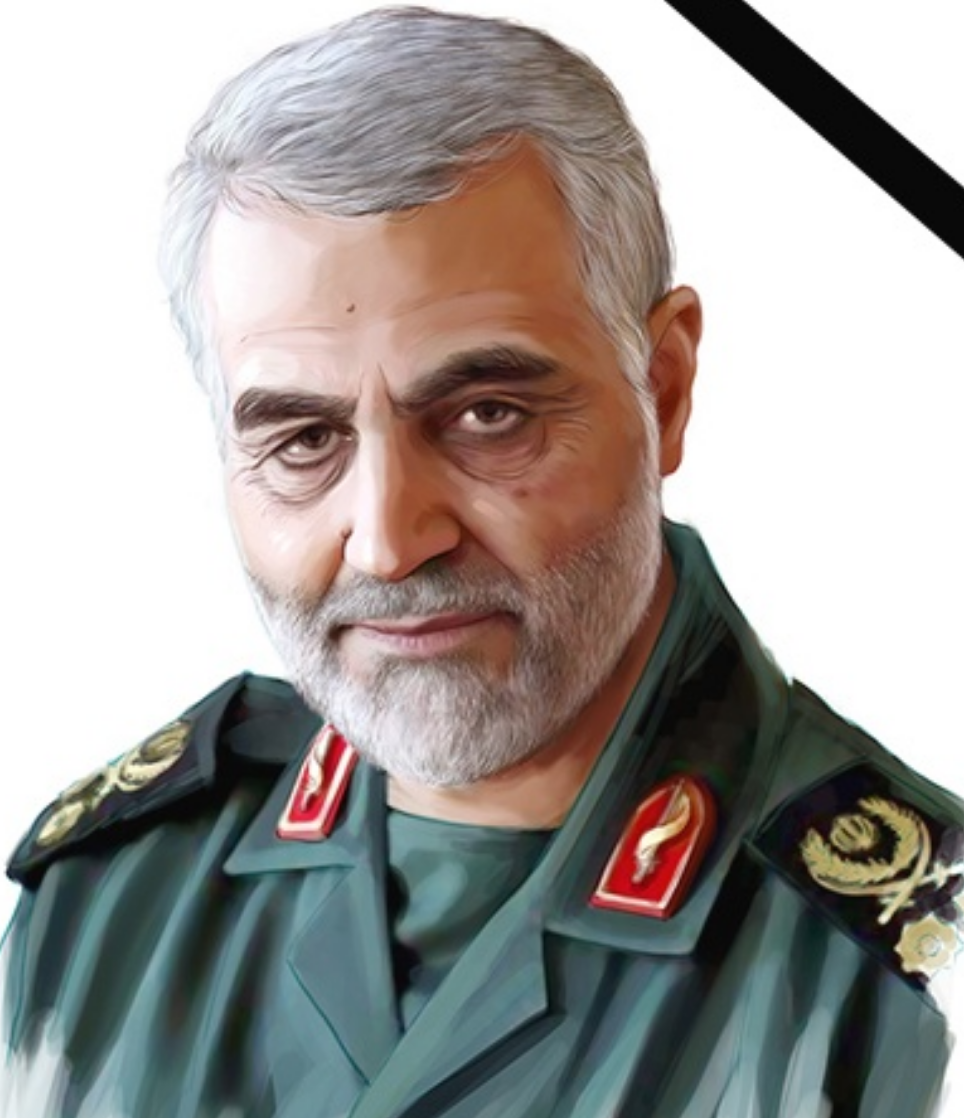
General Qassem Soleimani Iranian governement poster © Iranpress
But of course, back in January 2020, Iran did fire 22 missiles at a base in Iraq housing US and allied troops, in response to the US killing General Qassem Soleimani, described as head of the Quds force, an elite part of the Iranian Revolutionary Guard, who answered directly to the Supreme Leader. He had been held responsible by some countries, including the US, UK and Israel, for destabilising various politico-religious groups in the region, including Yemen’s Houthis, the Shia militia in Iraq and Hizbollah in Lebanon. But as one-time British Prime Minister Harold Wilson once famously said, a week is a long time in politics. Several months, therefore, is a veritable lifetime. And the UN Security Council has soundly rejected the United States’ request to reimpose sanctions on Iran. Indonesia, which currently holds the presidency, informed the United States that there was “no consensus” for a “snapback” of sanctions, prompting an angry response from Kelly Craft, the US envoy to the UN. She told the Security Council: “Let me just make it really, really clear: the Trump administration has no fear in standing in limited company on this matter. I only regret that other members of this council have lost their way and now find themselves standing in the company of terrorists.”
There’s no sign of Pompeo and Ayatollah Ali Khamenei kissing and making up any time soon. Their differences remain and both believe inevitably that God is on their side, as protagonists have believed since conflicts between nations or ethic groups first began. Since both men are so deeply religious, you might be excused for thinking there should be some common ground, but their respective concepts of faith remain as far apart as ever. Hawks and handsaws apart, the issue does not end as Hamlet said his story did. The rest is not silence, sadly, but a clamorous cacophony of angry words of conflict that could easily erupt into the real thing.
Click below to read the 2020 September edition of Europe Diplomatic Magazine

